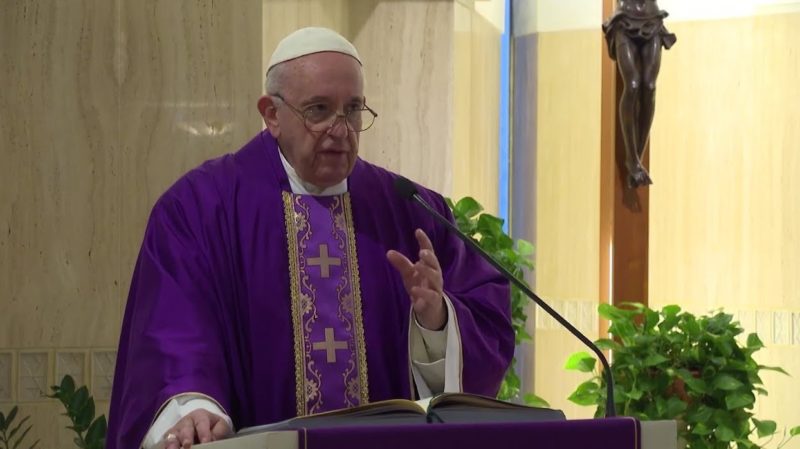Today Pope Francis delivered a very strong homily about our responsibilities towards the poor and the vulnerable. He speaks of a reality which is global, and the points he makes are very much worth pondering.
…today I would like to dwell on a word of Jesus. Six days before Easter – we are right at the door of the Passion – Mary makes this gesture of contemplation: Martha served – like the other step – and Mary opens the door to contemplation. And Judas thinks of money and thinks of the poor, but “not because he cared for the poor, but because he was a thief and, since he kept the cash, he took what they put into it” (Jn 12.6). This story of the non-faithful administrator is always current, always there are, even at a high level: we think of some charitable or humanitarian organizations that have many employees, many, that have a very rich structure of people and in the end only around forty percent goes to the poor, because sixty goes for the salaries of so many people. It is a way of taking money from the poor. But the answer is Jesus. And here I want to stop on this: “In fact, you always have the poor with you” (Jn 12,8). This is a truth: “In fact, you always have the poor with you”. The poor are there. There are many: there is the poor man we see, but this is the least part; the great quantity of the poor are those whom we do not see: the hidden poor. And we do not see them because we enter this culture of indifference which is negationist and we deny: “No, no, there are not many, they do not see each other; yes, that case … “, always diminishing the reality of the poor. But there are many, many.
Or also, if we do not enter into this culture of indifference, there is a habit of seeing the poor as ornaments of a city: yes, there are, like statues; yes, there are, they are seen; yes, that old woman asking for alms, the other one … as if it were a normal thing. It is part of the city’s ornamentation to have poor people. But the vast majority are the poor victims of economic policies, of financial policies. Some recent statistics make the summary like this: there is a lot of money in the hands of a few and a lot of poverty in many, in many. And this is the poverty of many people who are victims of the structural injustice of the world economy. And there are many poor people who are ashamed to show that they are not making ends meet; many poor of the middle class, who secretly go to Caritas and secretly ask and feel ashamed. The poor are much more [numerous] than the rich; very, very … And what Jesus says is true: “In fact, you always have the poor with you”. But do I see them? Do I notice this reality? Especially the hidden reality, those who are ashamed to say that they do not make ends meet.
I remember that in Buenos Aires I was told that the building of an abandoned factory, empty for years, was inhabited by about fifteen families who had arrived in the last few months. I went there. They were families with children and each had taken part of the abandoned factory to live. And, looking, I saw that each family had good furniture, furniture that has a middle class, they had television, but they went there because they could not pay the rent. The new poor who have to leave the house because they cannot pay it go there. It is that injustice of the economic or financial organization that brings them so. And there are many, many, to the point that we will meet them in the judgment. The first question Jesus will ask us is: “How do yo do with the poor? Did you feed? When he was in prison, did you visit him? In the hospital, did you see him? Did you assist the widow, the orphan? Because I was there. ” And on this we will be judged. We will not be judged for the luxury or the trips we make or the social importance we will have. We will be judged for our relationship with the poor. But if I, today, ignore the poor, leave them aside, I believe they are not there, the Lord will ignore me on the day of judgment. When Jesus says: “You always have the poor with you”, it means: “I, I will always be with you in the poor. I will be present there. ” And this is not being a communist, this is the centre of the Gospel: we will be judged on this.



